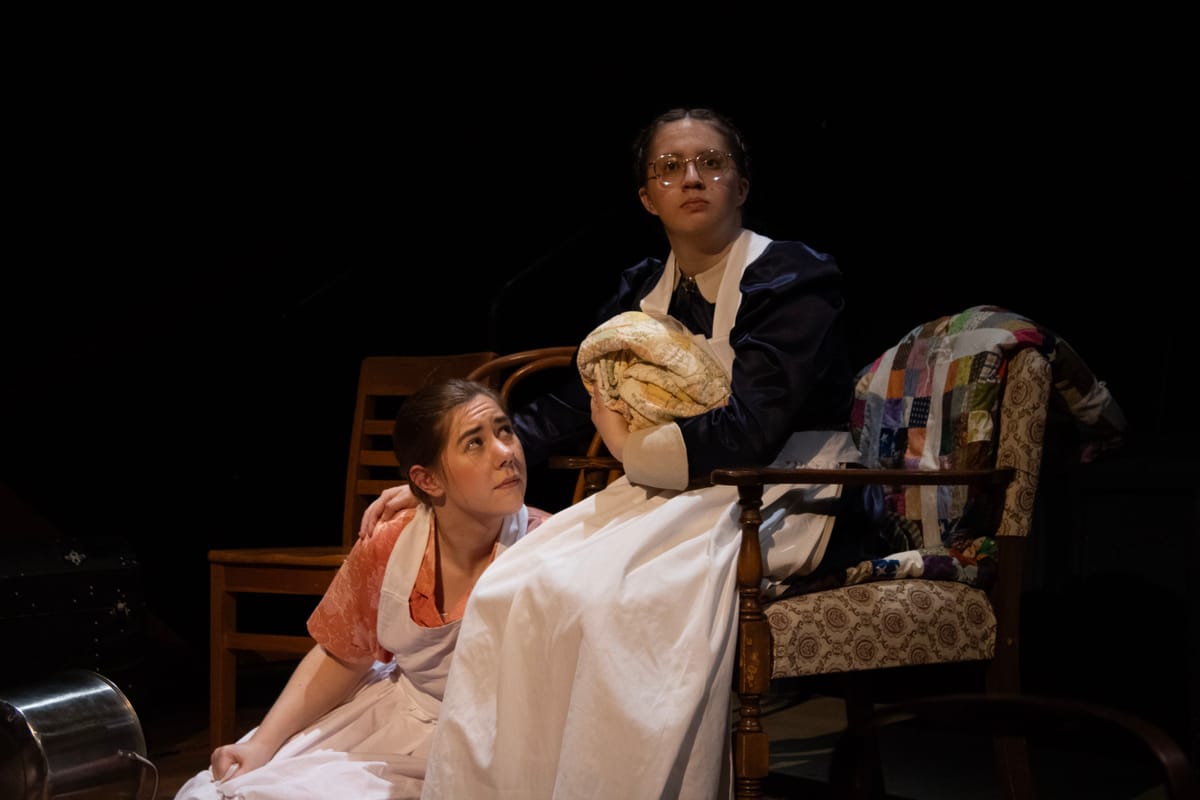Theatre shows playwrights’ collaborative work

Is it safe to be vulnerable?
This is the question three members of the Augustana community asked themselves. Their answer took the form of a 90-minute play.
After over two years of collaboration, alumnus Grace Ahles, senior Hanna Beshai and religion professor Richard Swanson managed to contain the complexities of vulnerability into a play. “This Is My Body” made its world premiere on Feb. 29 in the Edith Mortenson Center Theatre, shining light on a universal experience: what it means to have a body that is vulnerable.
The play began to take form when one of Swanson’s students started wrestling with the connotations of the biblical phrase “this is my body.” Swanson said that after several engaging discussions, he noticed an important connection between the historic phrase and modern culture.
“I realized that phrase is, of course, crucial for Christian theology, but it’s also part of every ‘MeToo’ story I’ve ever heard,” Swanson said. “And I realized that collision is the sort of thing you can make a play out of, and it’s something that I needed to explore because that connection is just too rich and important to ignore.”
Swanson crafted two seminar courses to discuss the intricacies of the phrase “this is my body,” which is where he became acquainted with the play’s co-writers, Beshai and Ahles.
It was a whim, Beshai said, that made her sign up for Religion 320: “This Is My Body.” She said she believes the class came along at just the right time for her to begin to grapple with things happening in her personal life.
“This [class] was a perfect space for me to be able to question ‘What does it mean to have a body?’” Beshai said. “‘What does it mean to have a body that is broken? What does it mean to have a body that can be harmed, that has scars and marks on that body? What does it mean to have a body that disintegrates over time?’”
“This Is My Body” tells a singular story shared by four generations of women. While each woman has her own journey to make, they all reminisce over their bodies — how they were broken or used or healed.
The play explores themes of pregnancy loss, assault, abortion and physical disability. Although all of these experiences can leave a body hurt and broken, “This Is My Body” shows how the support of a community can ease the burden of these hardships.
Swanson said the female experience takes the spotlight of this production.
“The other thing that was important to Grace and Hannah and me was that we are not making a cowboy movie,” Swanson said. “In cowboy movies, women are vulnerable and men save them — ish. For one thing, it’s a very dangerous structure.”
Swanson said that although these sorts of experiences happen primarily to women, men can also have active roles in them.
“We focused on the vulnerability of the women and the way they support each other [and also] the way women and men support each other in discovering shared vulnerability,” Swanson said.
Beshai said that in some ways, the play also goes beyond ideas of gender. She said being vulnerable is a human experience, and it doesn’t discriminate between men and women.
“Really, it is a story about what it means to be a human being, but what it means to be a human being in relation to their body and the world around them and their stories,” Beshai said. “We learn from each other’s stories. We embody those stories. And those stories live in us. And those people live in us too. And it’s a broken narrative and it works because it is broken.”
Sophomore Suki Ford said her experience playing Mama, the oldest of the four generations, was incredibly moving.
“Our stories and experiences are always far more similar than we realize,” Ford said. “This show tells the story of one family, but it also tells the story of every person who has ever lived and who has ever inhabited a body. I know this show will connect in some way with every person in the audience, just like it did with all of us involved in the production.”
Swanson said the characters embody the human experience.
“They discover that they are surrounded by vulnerable people who will protect them, love them, hold them up [and] help them stand up again one more time,” Swanson said.
As many audience members left the auditorium with tear-stained cheeks, the goals of Ahles, Beshai and Swanson came to fruition.
Freshman Maya Madson said she walked out of the theatre on the afternoon of March 2 feeling validated as a woman.
“I felt that my experiences as a woman were seen and recognized,” Madson said. “The play made me realize that my ‘scars’ are what make me who I am and will make future generations from myself who they are as well.”
While the audience members and the actors were mostly strangers to each other, Beshai said she hopes everyone in the auditorium built a bond with one another.
“Maybe they walked in strangers, but when they leave, they are no longer strangers to each other. Because that person next to you, whether or not you know their name, is down there, and you are down there too, on that stage,” Beshai said. “It’s my story. It’s your story. It’s everybody’s story.”



